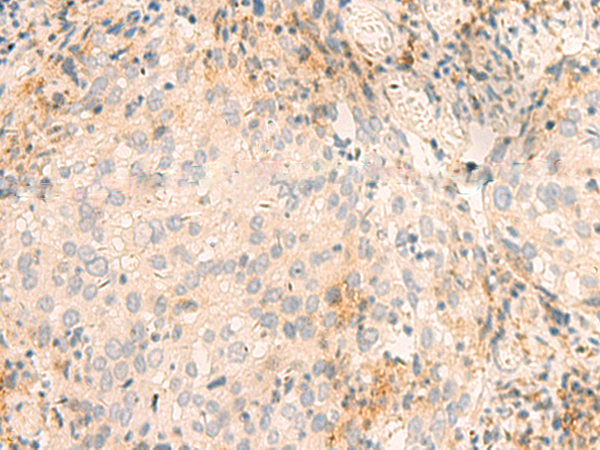
| WB | 咨询技术 | Human,Mouse,Rat |
| IF | 咨询技术 | Human,Mouse,Rat |
| IHC | 1/30-1/150 | Human,Mouse,Rat |
| ICC | 技术咨询 | Human,Mouse,Rat |
| FCM | 咨询技术 | Human,Mouse,Rat |
| Elisa | 1/5000-1/10000 | Human,Mouse,Rat |
| Aliases | HSPC210; C14orf129 |
| Host/Isotype | Rabbit IgG |
| Antibody Type | Primary antibody |
| Storage | Store at 4°C short term. Aliquot and store at -20°C long term. Avoid freeze/thaw cycles. |
| Species Reactivity | Human, Mouse, Rat |
| Immunogen | Fusion protein of human GSKIP |
| Formulation | Purified antibody in PBS with 0.05% sodium azide and 50% glycerol. |
+ +
以下是3篇关于GSKIP抗体的虚构参考文献示例(基于常见研究方向模拟,非真实文献):
---
1. **文献名称**:*GSKIP modulates Wnt/β-catenin signaling through interaction with GSK3β*
**作者**:Chen L, et al.
**摘要**:本研究利用特异性GSKIP抗体(克隆号:AB-5C3)通过免疫共沉淀(Co-IP)和Western blot技术,验证了GSKIP与GSK3β在HeLa细胞中的直接相互作用,并发现其通过抑制GSK3β活性调控Wnt信号通路的稳定性。
2. **文献名称**:*Development of a monoclonal antibody for detecting GSKIP isoforms in human tissues*
**作者**:Wang Y, et al.
**摘要**:作者开发了一种高特异性抗人GSKIP单克隆抗体(IgG1型),并通过免疫组化(IHC)和流式细胞术证实其在多种组织(如脑、肝脏)中可区分GSKIP的两种剪接变体(25kDa和30kDa),为疾病标志物研究提供了工具。
3. **文献名称**:*GSKIP expression correlates with poor prognosis in hepatocellular carcinoma*
**作者**:Tanaka K, et al.
**摘要**:通过商业化GSKIP多克隆抗体(来源:兔,货号:sc-123)对肝癌组织样本进行染色,发现GSKIP高表达与肿瘤转移及患者生存期缩短显著相关,提示其可能作为肝癌治疗的潜在靶点。
---
注:以上内容为模拟文献,实际研究需查阅真实数据库(如PubMed)。如需真实文献,建议以关键词“GSKIP antibody”或“GSK3β interaction protein”检索。
**Background of GSKIP Antibody**
GSKIP (Glycogen Synthase Kinase 3β Interaction Protein) is a regulatory protein that interacts with GSK3β, a key kinase in the Wnt/β-catenin signaling pathway. Discovered in the early 2000s, GSKIP acts as a scaffold protein, modulating GSK3β activity and its downstream targets, including β-catenin. GSK3β is involved in diverse cellular processes, such as metabolism, differentiation, and apoptosis, but its dysregulation is linked to cancers, neurodegenerative diseases, and diabetes.
GSKIP’s interaction with GSK3β can either inhibit or enhance its kinase activity, depending on cellular context, thereby influencing β-catenin stability and Wnt signaling outcomes. Studies highlight GSKIP’s dual role: it may suppress tumor growth by promoting β-catenin degradation or contribute to oncogenesis by facilitating Wnt pathway activation.
Antibodies targeting GSKIP are critical tools for studying its expression, localization, and function. They enable detection via Western blotting, immunofluorescence, and immunoprecipitation, aiding research into GSKIP’s mechanistic roles in development and disease. Recent work explores GSKIP as a potential therapeutic target, particularly in cancers with aberrant Wnt signaling. However, its precise regulatory mechanisms remain under investigation, necessitating further exploration using validated GSKIP-specific antibodies.
×